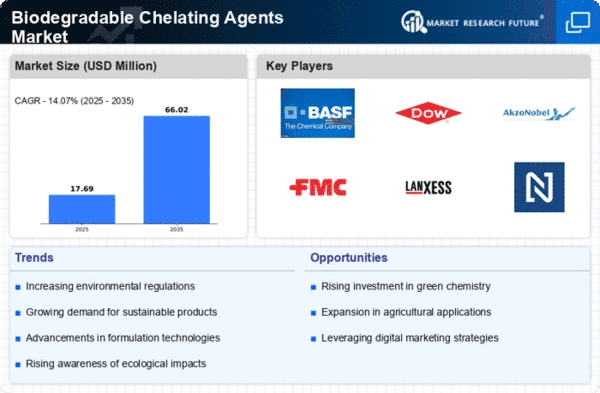Top Industry Leaders in the Biodegradable Chelating Agents Market

The biodegradable chelating agents market is a hidden gem, simmering beneath the surface of the larger chemical landscape. This niche market harbors immense potential, fueled by sustainability concerns and the growing demand for eco-friendly alternatives. In this vibrant ecosystem, players grapple for market share, employing diverse strategies and adapting to ever-evolving trends. Let's delve into this intricate world and explore the factors shaping the competitive landscape.
Strategies Stealing the Show:
-
Product Diversification: Leading players like BASF and Lanxess are expanding their portfolios beyond traditional EDTA and NTA derivatives, developing new biodegradable chelates based on citric acid, succinic acid, and other renewable sources. This caters to specific application needs and offers customers greater choice. -
Technological Advancements: The quest for the perfect biochelate is on. Companies like EcoTech Chemicals are investing in research and development, exploring new chelating moieties, and optimizing production processes to enhance biodegradability, performance, and cost-effectiveness. -
Sustainability Focus: Green credentials are the new gold standard. Kemira Oyj is leading the charge by developing completely bio-based chelating agents from agricultural waste, aligning with eco-conscious consumer preferences and environmental regulations. -
Geographic Expansion: Emerging economies like China and India present fertile ground for growth. Ecolab is strategically establishing production facilities in these regions to capitalize on the growing demand for affordable and readily available biodegradable chelating agents. -
Vertical Integration: Gaining control of the supply chain is crucial. Dow Chemical Company, for instance, is acquiring raw material sources and collaborating with bio-refineries to ensure a sustainable and cost-competitive supply of bio-based starting materials.
Factors Shaping Market Share:
-
Application Focus: Different applications demand specific chelating properties. In household cleaners, biodegradability and safety are paramount, while industrial applications might prioritize metal-binding capacity and compatibility with harsh environments. Companies like Chemetall excel at tailoring their biochelates to specific needs. -
Cost Competitiveness: Price remains a key consideration, particularly for bulk applications. Asian manufacturers often offer cost-effective options, while European and American players command premium prices for high-performance, bio-based chelates. -
Regulatory Landscape: Stringent regulations on environmental and human health are driving the market. The European Union's REACH regulation, for instance, restricts the use of certain traditional chelates, creating opportunities for biodegradable alternatives. -
Technological Innovation: New chelating moieties, production processes, and even enzyme additives can disrupt the market. BioAmber, for instance, is pioneering the use of bio-derived succinic acid for chelate production, offering a sustainable and cost-competitive option. -
Consumer Awareness: The rising tide of environmental consciousness is fueling demand for greener products. Companies like Henkel are promoting the biodegradability and eco-friendly credentials of their chelating agents, attracting environmentally responsible consumers.
Key Players:
BASF SE, Akzo Nobel, DowDuPont, Nouryon, Mitsubishi Chemical Corporation, Zhonglan industry, Tosoh Corporation, ADM, Natural Ingredients Corp., Nouryon.
Recent Developments:
August: Lanxess partners with a leading enzyme manufacturer to develop a novel enzyme-based chelate for enhanced biodegradation and performance.
September: EcoTech Chemicals unveils a new family of biochelates derived from waste citrus peels, offering a sustainable and cost-effective solution for industrial cleaning applications.
October: The European Union proposes a ban on certain harmful chemicals used in household cleaning products, further boosting demand for biodegradable chelating agents.
November: A consortium of chemical and consumer goods companies launches a research initiative to develop standardized biodegradability testing protocols for chelating agents, promoting transparency and consumer confidence.
December: A major investment firm acquires a promising startup developing bio-based chelating agents from algae, highlighting the growing interest in innovative and sustainable solutions.










